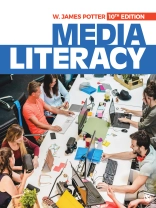Media Literacy teaches students how to navigate through the overwhelming flood of information found in today’s media-saturated world. Drawing from thousands of media research studies, author W. James Potter explores key components to understanding the fascinating world of mass media. Potter presents examples and facts to help students understand how the media operate, how they attract attention, and how they influence the public. Chapters conclude with exercises to help readers apply the material to everyday life and improve their media literacy. The
Tenth Edition integrates a stronger focus on digital media, features a streamlined organization, and updates facts to keep readers informed on the rapidly changing media phenomenon.
Содержание
Preface
Acknowledgments
About the Author
PART I. INTRODUCTION
Chapter 1. Why Increase Media Literacy?
The Information Problem
Dealing with the Information Problem
The Big Question
Summary
Further Reading
Keeping Up to Date
Chapter 2. Media Literacy Approach
What Is Media Literacy?
The Three Building Blocks of Media Literacy
The Definition of Media Literacy
The Development of Media Literacy
Advantages of Developing a Higher Degree of Media Literacy
Summary
Further Reading
Exercise
PART II. EFFECTS
Chapter 3. Broadening Our Perspective on Media Effects
Using the Four-Dimensional Analytic Tool
Becoming More Media Literate
Summary
Further Reading
Exercises
Chapter 4. How Does the Media Effects Process Work?
Media Effects Are Constantly Occurring
Factors Influencing Media Effects
Thinking about Blame
Becoming More Media Literate
Summary
Further Reading
Keeping Up to Date
Exercises
PART III. INDUSTRY
Chapter 5. Development of the Mass Media Industries
The Evolution Pattern
Revolution Pattern of Development
Profile of Mass Media Workforce
Summary
Further Reading
Keeping Up to Date
Exercises
Chapter 6. Economic Perspective
The Media Game of Economics
Characteristics of the Game
Media Industry Strategies
Consumers’ Strategies
Summary
Further Reading
Keeping Up to Date
Exercises
PART IV. AUDIENCE
Chapter 7. Audience: Industry Perspective
The Shift from Mass to Niche Perspective on Audience
Identifying Niches
Attracting Audiences
Conditioning Audiences
Summary
Further Reading
Exercises
Chapter 8. Audience: Individual Perspective
Information Processing
Analyzing the Idea of Exposure to Media Messages
Information-Processing Traits
The Media Literacy Approach
Summary
Further Reading
Exercises
PART V. CONTENT
Chapter 9. Entertainment
What Is Entertainment?
Telling Stories as a Business
Becoming Media Literate with Entertainment Messages
Summary
Further Reading
Keeping Up to Date
Exercises
Chapter 10. Advertising
Advertising Is Pervasive
Advertising Strategies
Tools of Advertising
Becoming More Media Literate with Advertising
Summary
Further Reading
Keeping Up to Date
Exercises
Chapter 11. News
Dynamic Nature of News
Different Perspectives on News
Standards for Evaluating News
How Can We Become More Media Literate with News?
Summary
Further Reading
Keeping Up to Date
Exercises
Chapter 12. Competitive Experiences
Attraction to Digital Games
Creating Digital Game Platforms
Types of Games
Addiction to Digital Games
Media Literacy
Summary
Further Reading
Keeping Up to Date
Exercise
Chapter 13. Social Networking Experiences
Friendship
Dating
Living
Opinion Sharing
Media Literacy with Social Networking
Summary
Further Reading
Keeping Up to Date
Exercise
Chapter 14. Acquisition Experiences
Information
Music
Video
Shopping
Acquisition Issues
Media Literacy with Acquisition Platforms
Summary
Further Reading
Keeping Up to Date
Exercises
PART VI. SPRINGBOARD
Chapter 15. Helping Yourself and Others to Increase Media Literacy
Helping Yourself
Helping Others
Summary
Keeping Up to Date
Exercises
INTRODUCTION TO THE ISSUES CHAPTERS
Issue 1. Ownership of Mass Media Businesses
Delineating the Issue
Evidence of Concentration
Evidence for Harm
Your Own Informed Opinion
Conclusion
Further Reading
Keeping Up to Date
Applying Media Literacy Skills
Issue 2. Sports
Delineating the Issue
The Money Cycle
Olympics
Video Gaming
The Big Picture
Your Own Informed Opinion
Further Reading
Keeping Up to Date
Applying Media Literacy Skills
Issue 3. Media Violence
Delineating the Issue
Public’s Perspective
Producers’ Faulty Beliefs
Your Own Informed Opinion
Further Reading
Applying Media Literacy Skills
Issue 4. Privacy
Delineating the Issue
Criminal Threats to Your Privacy
Noncriminal Threats to Your Privacy
Public Opinion and Regulations
Your Own Informed Opinion
Further Reading
Keeping Up to Date
Applying Media Literacy Skills
Glossary
References
Index
Об авторе
W. James Potter, professor at the University of California at Santa Barbara, holds one Ph D in Communication Studies and another in Instructional Technology. He has been teaching media courses for more than two decades in the areas of effects on individuals and society, content narratives, structure and economics of media industries, advertising, and journalism. He has served as editor of the Journal of Broadcasting & Electronic Media and is the author of many journal articles and several dozen books, including: Media Effects; Media Literacy, 10th edition; The 11 Myths of Media Violence; Major Theories of Media Effects; Becoming a Strategic Thinker: Developing Skills for Success; and 7 Skills of Media Literacy.












